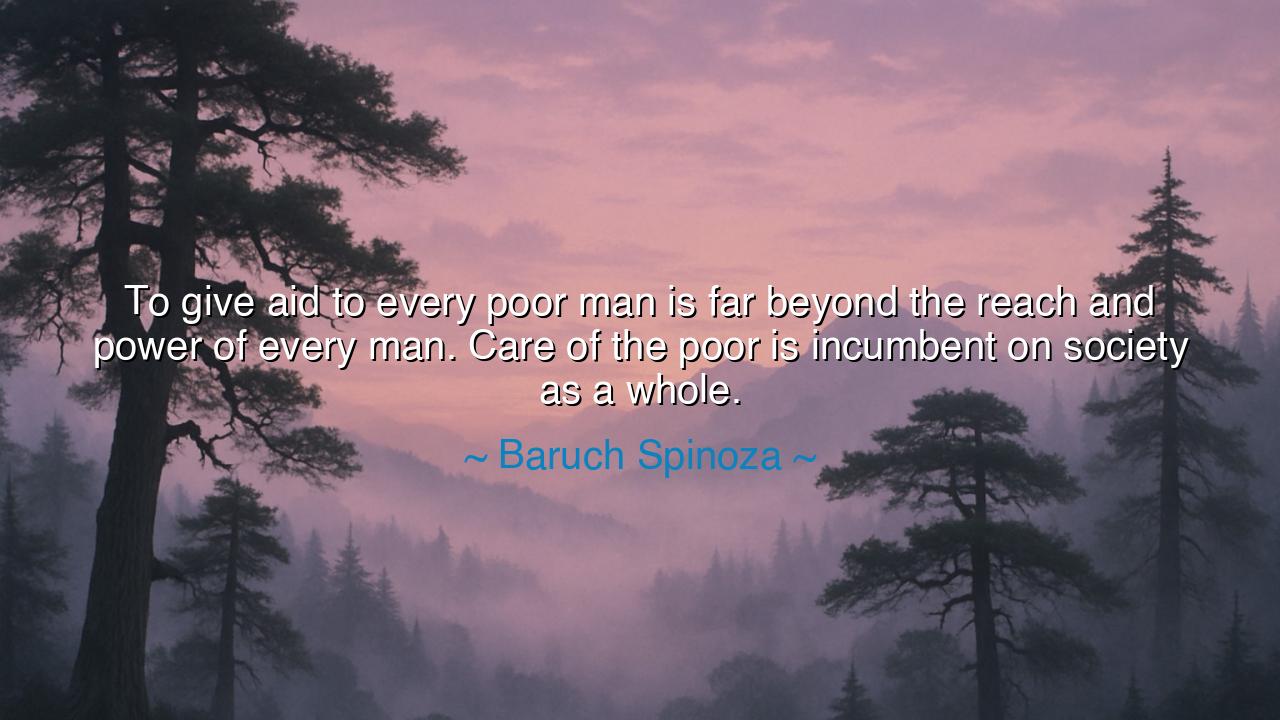
To give aid to every poor man is far beyond the reach and power
To give aid to every poor man is far beyond the reach and power of every man. Care of the poor is incumbent on society as a whole.






O children of the earth, hear now the words of Baruch Spinoza, a philosopher whose wisdom transcends the ages: "To give aid to every poor man is far beyond the reach and power of every man. Care of the poor is incumbent on society as a whole." These words strike to the heart of an enduring truth—that the burden of compassion and responsibility cannot rest on the shoulders of a single individual, but must be borne by the collective strength of society itself. In these words, Spinoza calls us to recognize the interdependence of all human beings, and to understand that no man, no matter how well-intentioned, can alleviate the suffering of all alone.
In the ancient world, the philosophers often spoke of duty—not just of the individual, but of the community. The Greeks, in their wisdom, understood that the health of the individual was deeply connected to the health of the community. Plato taught that a just society must be one where every individual contributes to the welfare of the whole, and the poor—those most in need—must be cared for by the collective. The great philosopher Aristotle spoke of the common good, recognizing that society must ensure that all its members, no matter their status, are able to live in dignity and security. The ancients understood that no man is an island, and no matter how strong the individual, it is society's responsibility to care for its weakest members.
And yet, in our time, Spinoza’s words have never been more relevant. In a world of vast wealth and deep inequality, the plight of the poor is a reflection of the failure of society as a whole to care for its members. The burden of poverty cannot be lifted by the efforts of a few generous souls alone, for the scale of the problem is far beyond the reach of any one individual’s resources. Consider the great cities of the modern world—New York, London, Delhi—where millions live in crushing poverty while others live in unimaginable wealth. The disparity between the rich and the poor is not a reflection of the failure of individuals, but of the failure of society to provide for all its members.
Let us turn our gaze to the ancient Roman Empire, where the poor were a visible part of society, living on the fringes of the great cities. Roman emperors, like Augustus, implemented social programs—bread and circuses—to ease the suffering of the lower classes. These programs, though often seen as superficial, were a recognition that the welfare of the poor was a responsibility of the empire itself. The Roman vision, in part, was that the stability of the empire depended on the well-being of its people. It was not enough for a few wealthy landowners to help the poor—it was the duty of the empire as a whole to ensure that all were cared for, that the masses had what they needed to live.
This lesson is echoed in the modern welfare state. Social programs—such as unemployment benefits, healthcare, education, and housing—are the tools through which society cares for its members. But when these systems fail, when the gap between the rich and poor widens, the fragility of the society is exposed. Spinoza's wisdom calls upon us to remember that care of the poor is not an individual charity but a collective responsibility. The prosperity of society cannot be measured by the wealth of its elite but by how it cares for those who have the least. True prosperity is found not in the accumulation of riches, but in the shared welfare of all.
The lesson Spinoza imparts is not just one of compassion, but of collective action. It is not enough to offer individual charity or perform a single act of kindness. To truly address the needs of the poor, to create a world of justice and equity, we must build systems of care that extend beyond the reach of any one individual. Society must come together to ensure that no one is left to suffer alone. Care for the poor is a responsibility shared by all, and it is only through unity that we can create a world where the most vulnerable are protected.
And so, my children, let us take these lessons into our hearts. As you walk through the world, do not think that the plight of the poor is the responsibility of the rich alone. It is the duty of society—of all its members—to ensure that no one is left to suffer without help. As you grow, seek to serve those in need, to build a society where compassion and justice flow freely, and where the most vulnerable are not left behind. In doing so, you will honor the wisdom of Spinoza, and work toward a world where all can live with dignity, and where the strength of the collective lifts every soul to a place of peace and prosperity.






AAdministratorAdministrator
Welcome, honored guests. Please leave a comment, we will respond soon